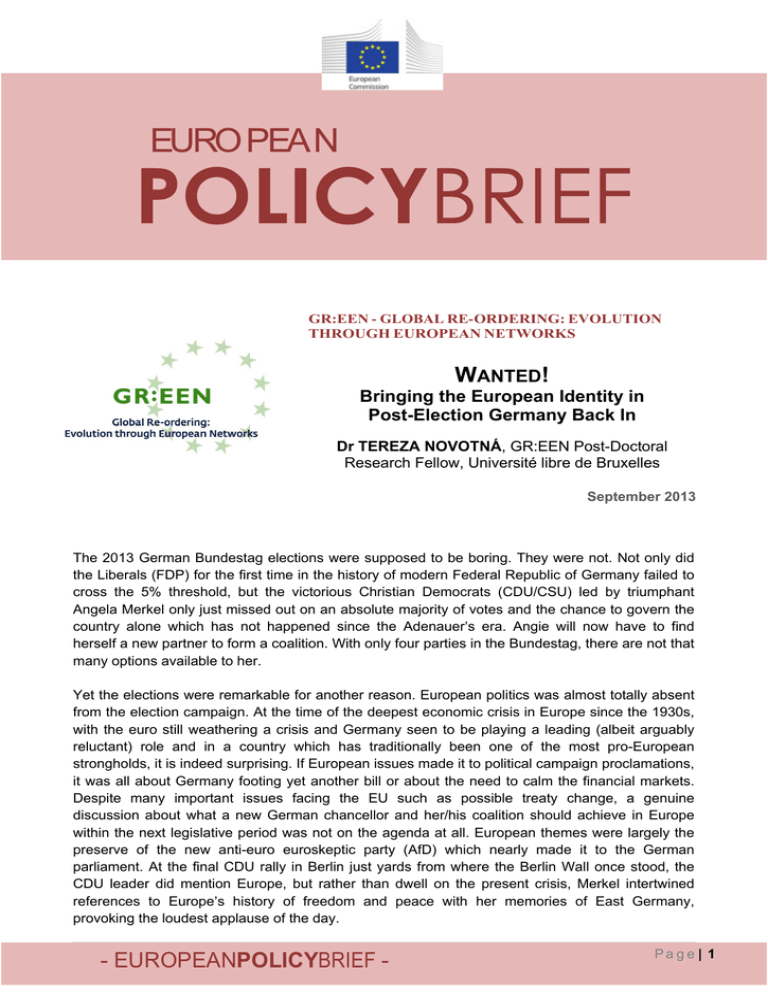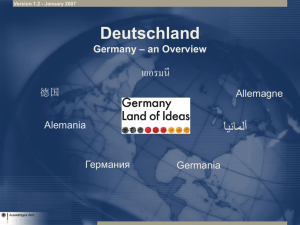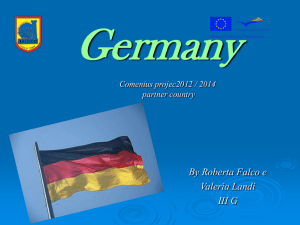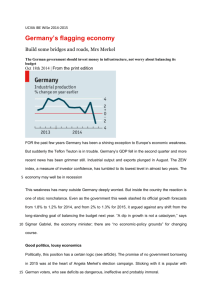EUROPEAN W !
advertisement

EUROPEAN GR:EEN - GLOBAL RE-ORDERING: EVOLUTION THROUGH EUROPEAN NETWORKS WANTED! Bringing the European Identity in Post-Election Germany Back In Dr TEREZA NOVOTNÁ, GR:EEN Post-Doctoral Research Fellow, Université libre de Bruxelles September 2013 The 2013 German Bundestag elections were supposed to be boring. They were not. Not only did the Liberals (FDP) for the first time in the history of modern Federal Republic of Germany failed to cross the 5% threshold, but the victorious Christian Democrats (CDU/CSU) led by triumphant Angela Merkel only just missed out on an absolute majority of votes and the chance to govern the country alone which has not happened since the Adenauer s era. Angie will now have to find herself a new partner to form a coalition. With only four parties in the Bundestag, there are not that many options available to her. Yet the elections were remarkable for another reason. European politics was almost totally absent from the election campaign. At the time of the deepest economic crisis in Europe since the 1930s, with the euro still weathering a crisis and Germany seen to be playing a leading (albeit arguably reluctant) role and in a country which has traditionally been one of the most pro-European strongholds, it is indeed surprising. If European issues made it to political campaign proclamations, it was all about Germany footing yet another bill or about the need to calm the financial markets. Despite many important issues facing the EU such as possible treaty change, a genuine discussion about what a new German chancellor and her/his coalition should achieve in Europe within the next legislative period was not on the agenda at all. European themes were largely the preserve of the new anti-euro euroskeptic party (AfD) which nearly made it to the German parliament. At the final CDU rally in Berlin just yards from where the Berlin Wall once stood, the CDU leader did mention Europe, but rather than dwell on the present crisis, Merkel intertwined references to Europe s history of freedom and peace with her memories of East Germany, provoking the loudest applause of the day. - EUROPEANPOLICYBRIEF - Pa g e | 1 So why did neither CDU nor any other mainstream party speak about Europe? Pundits disagree whether it stems from the fact that politicians think that they cannot score any political points with the topic or the challenges of explaining the intricacies of Brussels decision-making. Yet all previous CDU as well as SPD chancellors, from Adenauer through Brandt and Kohl to Schröder, were convinced Europeans who would project German identity through Europe. Why is not Angela Markel using the same strategy? Why does she speak about the EU in terms of costs and benefits rather than values and identity? The explanation might be simple and lie in her personal history. All previous German leaders, either those born pre- or post-war, were all Europeans by their nature who were socialized into thinking that Europe is here to redeem the German past and that Germany is obliged to be a good European. Yet Angela Merkel, an East German, has experienced Europe only as a second tier entity. After the collapse of the Berlin Wall, East Germans primarily wanted to join their Western neighbour. It was only through the unification of Germany that they joined the EU (EC). Thus they did not even need to go through the painstaking accession process and, unlike in other post-communist states, calls for return to Europe were not high on their agendas. As an East German, Angela Merkel perhaps does not feel the deep-seeded gratitude to Europe and, similarly to many Central and East Europeans, sees the EU as a cash cow albeit as the one to be fed rather than milked. It was striking that the CDU won the West of Berlin, while the communist-successor die Linke came out on top in East Berlin. Next year Germans will celebrate 25 years since the fall of the Berlin Wall, but the communist past and the division of Germany still matter a quarter of a century on. They matter to explain the electoral split, but they also matter to explain Merkel's stance. Thus, if any coalition will indeed be formed, the "most wanted" job from Merkel s future partner should be: bringing the German European identity back in. Dr Tereza Novotná (Tereza.Novotna@ulb.ac.be) is a GR:EEN Postdoctoral Research Fellow at Université Libre de Bruxelles. She was a member of the International Association for the Study of German Politics (IASGP) group to observe the 2013 German federal elections. She is grateful to Dr Martine Huberty and Dr Dan Hough for allowing her to participate in the election mission. - EUROPEANPOLICYBRIEF - Pa g e | 2



